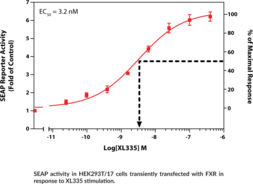Territorial Availability: Available through Bertin Technologies only in France
- Correlated keywords
- amphipathic liver microorganism micro-organism pregnane PXR vitamin D3 VDR constitutive androstane CAR retinoic RXR export pump BSEP
- Product Overview:
Cayman’s reverse transfection reporter assays have overcome many of the disadvantages of other transfection approaches. In this method, a proprietary transfection complex containing DNA and an optimized mixture of lipids and proteins has been evenly immobilized on the culture surface of multi-well plates. Adherent cells, supplied by the user, are applied directly to the plate and allowed to grow in the coated wells. Using this method, the uptake of the DNA complex by the cell is increased dramatically compared to solution-phase transfection, enhancing both the transfection efficiency and co-transfection efficiency for multiple plasmids. Cayman’s Bile Acid Nuclear Receptor FXR (NR1H4) Reporter Assay Kit consists of a 96-well plate coated with a transfection complex containing DNA constructs for expressing FXR and a BSEP promoter-regulated secreted alkaline phosphatase (SEAP) reporter (FXR Reverse Transfection Strip Plate). Cells grown on the transfection complex will express FXR?2 inside the cells within 24 hours from an engineered plasmid construct. Binding of agonists to FXR triggers its transcription factor activity. Activation of the BSEP promoter on the reporter construct by FXR results in the expression of SEAP, which is secreted into the cell culture medium. Aliquots of media are collected 6-24 hours after stimulation, and SEAP activity is measured following addition of a luminescence-based alkaline phosphatase substrate (SEAP Substrate (Luminescence)). The kit is easy to use and can be readily applied to high-throughput screening for therapeutic compounds regulating the activation of FXR. A selective synthetic agonist, XL335, is included in the kit for use as a positive control.{37177} The kit provides sufficient reagent to measure SEAP activity at three time points using the three included assay plates.
Cayman Chemical’s mission is to help make research possible by supplying scientists worldwide with the basic research tools necessary for advancing human and animal health. Our utmost commitment to healthcare researchers is to offer the highest quality products with an affordable pricing policy.
Our scientists are experts in the synthesis, purification, and characterization of biochemicals ranging from small drug-like heterocycles to complex biolipids, fatty acids, and many others. We are also highly skilled in all aspects of assay and antibody development, protein expression, crystallization, and structure determination.
Over the past thirty years, Cayman developed a deep knowledge base in lipid biochemistry, including research involving the arachidonic acid cascade, inositol phosphates, and cannabinoids. This knowledge enabled the production of reagents of exceptional quality for cancer, oxidative injury, epigenetics, neuroscience, inflammation, metabolism, and many additional lines of research.
Our organic and analytical chemists specialize in the rapid development of manufacturing processes and analytical methods to carry out clinical and commercial GMP-API production. Pre-clinical drug discovery efforts are currently underway in the areas of bone restoration and repair, muscular dystrophy, oncology, and inflammation. A separate group of Ph.D.-level scientists are dedicated to offering Hit-to-Lead Discovery and Profiling Services for epigenetic targets. Our knowledgeable chemists can be contracted to perform complete sample analysis for analytes measured by the majority of our assays. We also offer a wide range of analytical services using LC-MS/MS, HPLC, GC, and many other techniques.
Accreditations
ISO/IEC 17025:2005
ISO Guide 34:2009
Cayman is a leader in the field of emerging drugs of abuse, providing high-purity Schedule I-V Controlled Substances to federally-licensed laboratories and qualified academic research institutions for forensic analyses. We are certified by ACLASS Accreditation Services with dual accreditation to ISO/IEC 17025:2005 and ISO Guide 34:2009.





